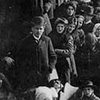Introduction to our series on Immigrant Success Stories

If I ever think my life is tough and I need a little perspective, I only need to think of the life of my Great-grandmother. I have never had any trials that come close to what she endured. This is her story:
As the Ottoman Empire started cracking and religious tensions between Muslims and Orthodox Christians began in Armenia, my great-grandfather sent his oldest son Sam to the US to see if the family could possibly relocate to America.
But before immigration became a possibility my grandmother’s siblings and parents were taken captive by soldiers in the Turkish army and eventually murdered. The Turkish government committed a mass genocide against the Armenians in 1915-1916 just prior to WW I, killing approximately 1.5 Armenians.
My great-grandmother survived. She was left for dead in the Syrian desert after falling behind on a death march. But it turned out she was extremely fortunate to fall behind, it turned out because her final destination would have been a mass grave. She was rescued by a man she called “the Governor.” It just twelve years old, she was sent to an orphanage on the island of Cyprus in Greece. After settling there, with the assistance of officials and several correspondence with U.S. immigration, she managed to locate her one surviving brother in Utah who would pay for her passage across the Atlantic and eventually to Salt Lake City, Utah.
When Takoohie arrived on Ellis Island in 1912, the border agent asked her to say her name slowly so he could translate it into English, “Ta — koo– hee,” she said. Takoohie is the spelling he chose. This unusual spelling and name remained with her for life. Witnessing the ledger, the brutal reality of her tragic life, which still according to Turkish official accounts, never happened—rang true. The world is an ugly place, and the US is special because there simply isn’t any other place so willing to accept immigrants who have suffered.
“Keep ancient lands, your storied pomp!” cries she
With silent lips. “Give me your tired, your poor,
Your huddled masses yearning to breathe free,
The wretched refuse of your teeming shore.
Send these, the homeless, tempest-tost to me,
I lift my lamp beside the golden door!”
—Emma Lazarus
This poem engraved on the base of the Statue of Liberty spoke perfectly to my great-grandmother’s plight, as well as the story of my Great-grandfather and her brother. They were among the “huddled masses wearing to breathe free.”
Shortly after arrival in Salt Lake City, Takoohie married Nishan Markosian. Immediately they began having children, a total of nine, seven of which survived to adulthood. Takoohie and Nishan built their retirement savings and acquired small rental properties. All of their children understood the value of hard work and became successful in their own right, never forgetting the lives of sacrifice that their parents made for them to secure a better future.
There are thousands of immigrant narratives similar to my great-grandma’s story. Millions of immigrants have come here seeking refuge. When my ancestors arrived, the US had an “open-border policy.” Anyone could become a citizen as long as they weren’t a polygamist or an anarchist.
This isn’t the case now, nor is it at all simple to enter or gain citizenship in any western country. This results from our need to protect the collective welfare states which are going bankrupt world-wide.
The United States strength resides in its acceptance and willingness to allow for thousands of immigrants to relocate here each year and sometimes thousands of refugees. It is the “golden door” set apart from the rest of the western world for the past 200 years due to both our acceptance of immigrants and our vibrant free market that have created the world’s leading super-power and economy.
This is the place where immigrants come to do big things. The U.S has stood apart in the ability of our immigrants to climb the socioeconomic ladder by virtue of hard work. There are all sorts of problems plaguing legal immigration today. Still, our acceptance of “huddled masses yearning to breathe free”. §


